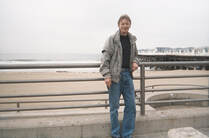CHARLES HAYES - HEGEL’S MASTER-SLAVE DIALECTIC WITH A MARXIST FLAIR APPLIED TO OUR WAR ON TERROR4/25/2019  Charles Hayes, a multiple Pushcart Prize Nominee, is an American who lives part time in the Philippines and part time in Seattle with his wife. A product of the Appalachian Mountains, his writing has appeared in Ky Story’s Anthology Collection, Wilderness House Literary Review, The Fable Online, Unbroken Journal, CC&D Magazine, Random Sample Review, The Zodiac Review, eFiction Magazine, Saturday Night Reader, Cha: An Asian Literary Journal, Scarlet Leaf Publishing House, Burning Word Journal, eFiction India, and others. HEGEL’S MASTER-SLAVE DIALECTIC WITH A MARXIST FLAIR APPLIED TO OUR WAR ON TERRORIt is through self consciousness that the master-slave dialectic is born. This birth is the result of a struggle by one party to survive under the domination of a stronger party. When relationships and their interactions are at least fair and respectful, if not equal, little if any struggle will take place for they are simply interactions between humans who happen to inhabit the same planet. In a word, life, au naturel, in its static sense. But when a stronger party injects a struggle into the relationship by allowing their strength and lack of self consciousness to disadvantage the other party the master-slave dialectic via the other party’s self consciousness, or struggle, is established. Consequently, the stronger group, lacking the degree of self consciousness and struggle that the weaker group has, will over time become weaker. And the weaker group will develop more strength through their struggle until they become superior and the former master-slave dialectic is reversed. It is here where true change can take place. Mandela’s South Africa comes to mind.
Upon becoming superior, the former oppressed created a fair and respectful relationship in its static sense, by not using their newfound power to disadvantage others. By doing this the birth of nations or peoples can come with their own destiny, new life. Until one or the other parties of that life tries to fix something that isn’t broke. In the beginning the war on terror developed between the United States and parts of the Middle East. And it did not occur in a vacuum. It took place because the more self conscious wanted to establish, for all to see and respond to, a pronounced master-slave dialectic. The dominant United States, although with as much power for insight and correction as power for dominance, chose to “turn the screw” of dominance and pay back. In a sense our response to the attack on the twin towers of the World Trade Center was so extreme that the screw became set. Some would say that this was a natural requirement for perpetual war. And that it was done with full knowledge of this because decline was imminent for our society. And the best way to deny this, but secretly acquiesce, was to show our power and say that we will go down swinging, an American concept that has been wielded about like no other. Perhaps, more simply, it was our time and the grace necessary to do it any other way did not exist. Every attempt to turn a screw that is already set is ultimately a waste of time and resources and does nothing more than shorten the time of the dialectic. Rome wasn't built in a day, for sure, but once the dialectic took place, as Paul Harvey used to say, “you know the rest of the story.” And it was not a long one. History is replete with such examples from the colonial powers on down to almost any power. “There is a time and a purpose to everything unto heaven.” Those that say that what we do is for the sake of our children, while those same children have to overcome their natural instincts to live and let live in order to honor their parents, seem to believe that history will respect them, where it did not the Romans and all others. When the screw is set to advantage, or compensate, one party or another, only the opposite can occur. There were those in power that knew, but dared not say, these things. They tried to mitigate some of what is. Surely, only by sleight of hand could this be done, for a people scared to acknowledge the obvious screamed and hollered that they were being deceived at every turn. But that is part of the dialectic as well. It would be too much of a struggle to do otherwise. May the journals that can, unblemished, make it through this, acknowledge those magicians who knew the score and still tended their kind. They were not defeatist. But they were not heifers that would follow a hay wagon into a slaughterhouse or a hovering mini-gun either. Enough struggle still lies there to get some of them through each day. So far.
0 Comments
Leave a Reply. |
 RSS Feed
RSS Feed